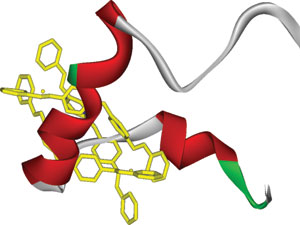
A cylindrical supramolecular complex (yellow) interacting with the central target region of the amyloid beta protein (green, white and red ribbon). Image credit: Xiaogang Qu
Supramolecular chemistry could provide a new avenue in the treatment of Alzheimer’s disease, say scientists in China. The group demonstrates for the first time that supramolecular complexes can inhibit the aggregation of a peptide thought to cause Alzheimer’s disease.
Alzheimer’s disease (AD) is the most common cause of dementia among the elderly and is estimated to affect over 35 million people worldwide, a figure which is expected to triple by 2050. One of the pathological hallmarks of the disease is the polymerisation of amyloid β-peptides (Aβ) into insoluble fibrous protein aggregates known as plaques. Scientists have been trying to develop inhibitors of Aβ aggregation as a therapeutic and preventive strategy for AD treatment. Most reported Aβ inhibitors are small organic molecules or peptides, many of which act non-specifically.
Read the full article in Chemistry World
Link to journal article
Metallosupramolecular Complex Targeting a/ß Discordant Stretch of Amyloid ß Peptide
H Yu et al
Chem. Sci., 2012, DOI: 10.1039/c2sc20372c










